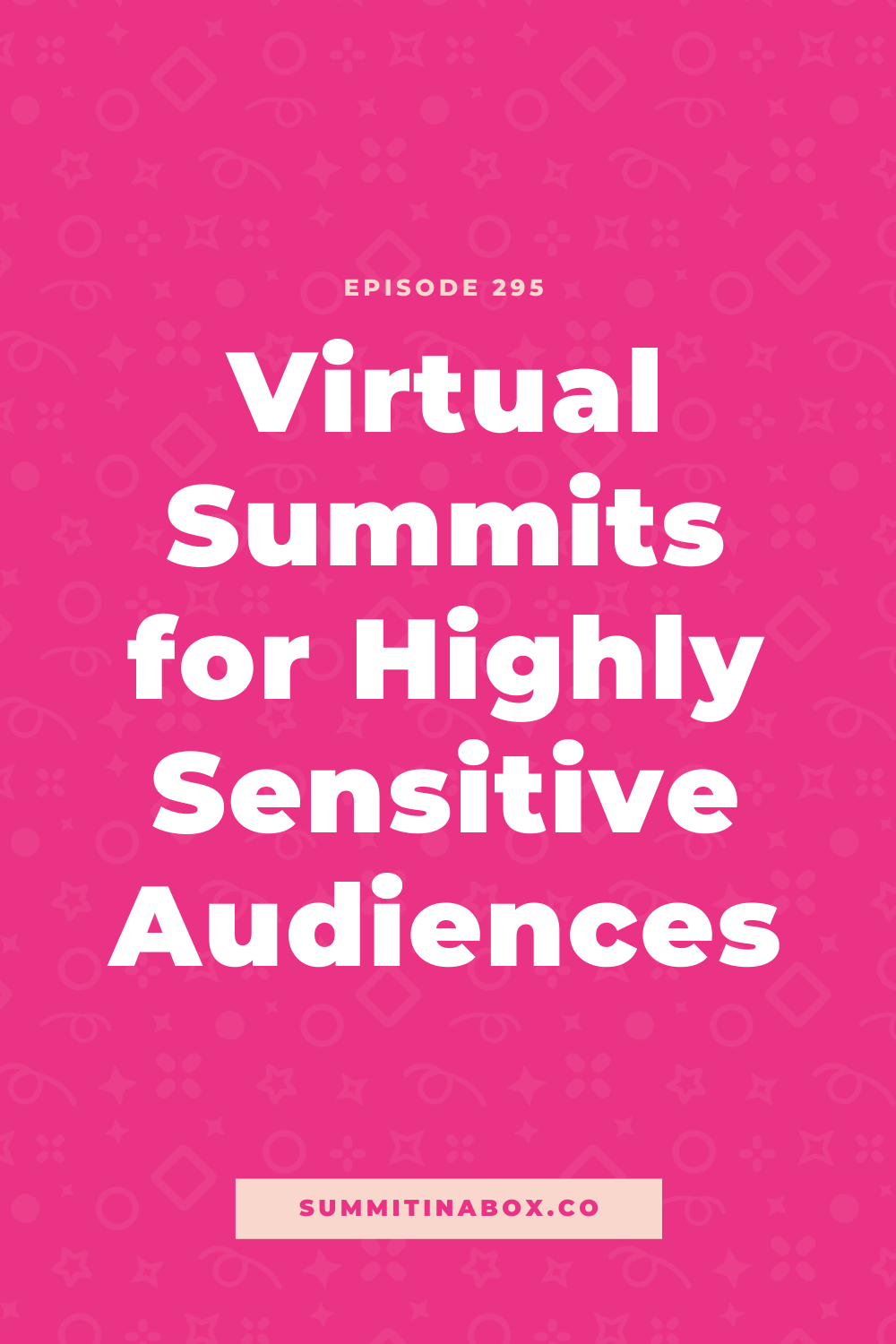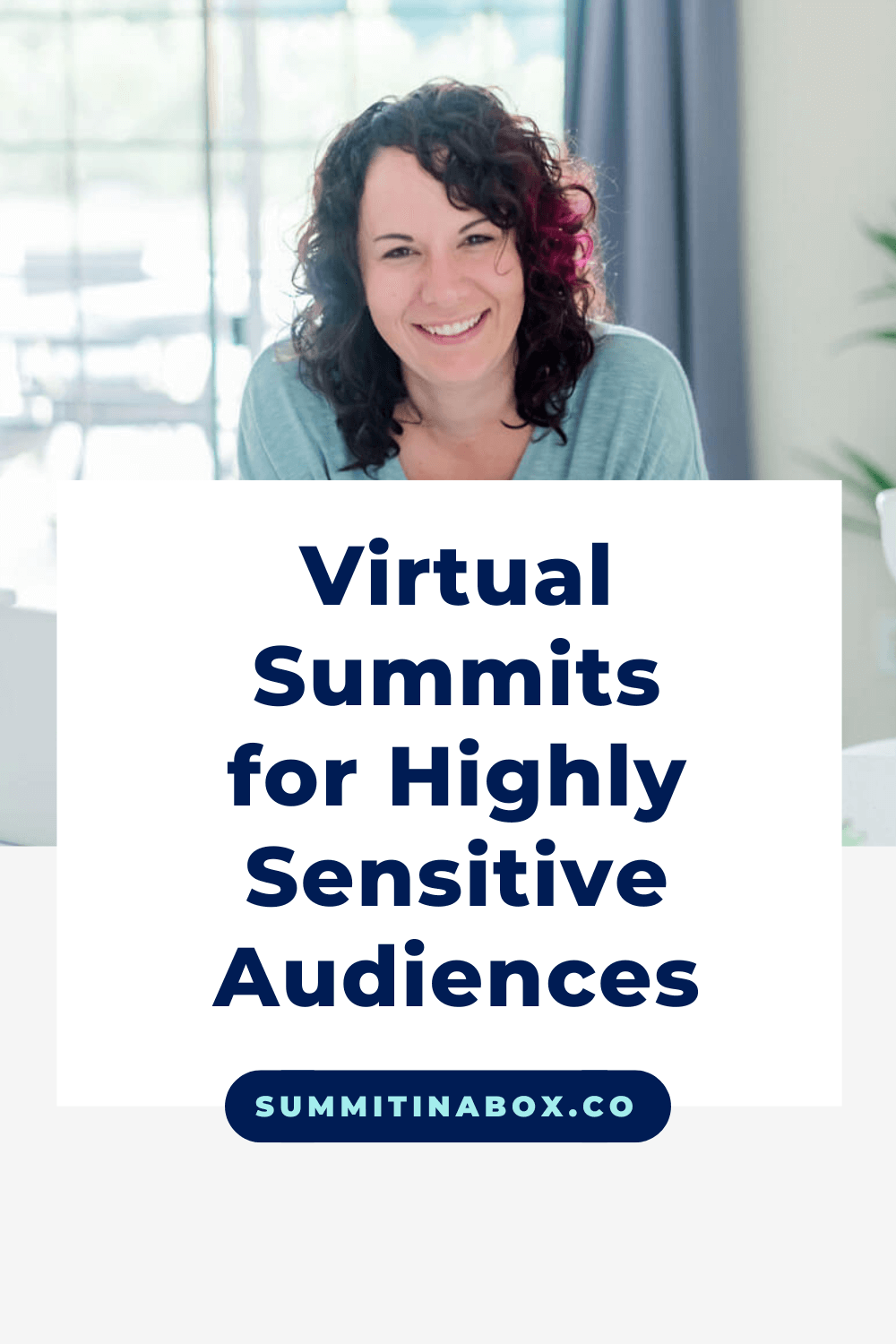Virtual Summits for Highly Sensitive Audiences


My goal is always to create a meaningful and engaging summit experience for attendees. But for some audiences, making that happen might require more thought and intention than others. What if your audience includes a lot of Highly Sensitive People (HSPs), neurodivergent individuals, or those navigating deep emotions like grief or trauma? How can you ensure your summit feels supportive rather than overwhelming or overly salesy?
That’s exactly what we’re diving into today. Whether you're specifically hosting a summit for HSPs or another emotionally sensitive audience, or you simply want to create a space that’s welcoming and accessible for everyone, this episode will give you key strategies to make it happen.
In our last episode, we talked about what it’s like to host a summit as a highly sensitive person. This time, we’re flipping the perspective and looking at what it means to host a summit for a highly sensitive audience, regardless of whether you identify as an HSP yourself.
Even if your summit isn’t explicitly for HSPs, I guarantee you have some in your audience, so these strategies can help you create a more positive and engaging experience for everyone.
Let’s get into it!
Listen to the episode
Keeping highly sensitive audiences in mind in your summit planning
We've had several clients come in to the Launch with a Summit Accelerator expecting to have to adapt our strategies to work for their highly sensitive audiences, and we work with them to make any needed adjustments while still keeping the core strategies in tact. Most of the time though, these summit hosts end up learning new approaches that serve their sensitive audiences when following our system. Our strategies keep highly sensitive audiences in mind because I am so sensitive - it just naturally wove itself into the strategy without me even realizing it at first! But now it’s definitely more intentional. These are some of the things we keep in mind for highly sensitive audiences:
Focus on people over profit in your virtual summit
This is good practice for everyone, not just HSPs. It's something that I always do (and teach). People over profit is a core piece of my summit hosting strategy and programs.
I will never advise you to add extra pressure or intentionally make your virtual summit difficult to consume just to drive all-access pass sales. Instead, I'll advise you to focus on people first, and you'll find that the results will follow.
Be a cheerleader, don't stir up pain points
For emotionally sensitive audiences, this is absolutely critical. That doesn't mean you can't mention them, but if you think your audience falls on the HSP spectrum, I'd recommend painting the picture enough to resonate, but don't turn it into manipulation. Do what you need to for them to see themselves, but then show them how you can help them achieve their desires instead of continuing to prod the pain.
Your role as a summit host becomes being the cheerleader, lifting up your attendees. It creates a better environment for everyone! Keep this role in mind as you're creating your registration page, marketing your all-access pass, and even as you choose your summit presentation topics.
Create a safe space for your summit community—and protect it!
This is also important for emotionally sensitive audiences. Your virtual summit community should be private and protected. A lot of people are becoming leery of Facebook, so you may want to consider an alternative platform.
Make sure you set out clear guidelines for the community and administer them. Moderate the conversations and show your attendees a ton of love and support in your summit community. Keep in mind that you may have to do a bit more work to get those conversations started, but it's worth it.
Consider ditching or modifying the countdown timers
I find this often applies more to neurodivergent audiences, but it can be good for people dealing with deep emotions too. I do teach using countdown timers, but it's not the right fit for every audience. You don't necessarily have to cut them entirely, though!
Countdown timers can be helpful in encouraging attendees to make a decision and it clearly shows the timeframe the offer is available. The options you might want to consider include:
- Removing timers from your summit completely
- I don't really recommend this, as it will have an impact on your conversion rates, which I've seen with clients who've opted to ditch countdown timers entirely
- Extend the length of time of the fast-action timer
- Just because we often use the 20- or 30-minute fast-action timer doesn't mean you have to! Play with the time limit that feels good for your audience
- Allow attendees to hide timers if it overwhelms them
Other considerations for a Highly Sensitive summit audience
A few other things you may want to take into consideration are your all-access pass offer, the support you give attendees, and how accessible your summit is.
For your all-access pass, you may want to think about how it can be extra supportive for those who upgrade. It's okay to think outside the box, too, especially when it comes to creating deeper opportunities for attendees to connect.
When it comes to summit attendee support, consider where you'll provide that support. (It's typically in the inbox and summit community, but there may be other platforms you want to use.) Make sure that you're extra understanding, patient, and gracious, and think about what situations you'll make exceptions to any canned responses you may have in place. Remember to see support as a way to serve your audience, not an obstacle!
Accessibility is often a barrier for HSP audiences, especially neurodivergent people, so consider ways you can make your summit more accessible. That could be offering 48-hour replays, rather than 24 hours. It might be ensuring there are video controls so they can play it at whatever speed they need and control playback. I also recommend offering captions and transcripts, as well as audio and video options for the sessions, so that it's accessible to everyone.
Regardless of whether you're a Highly Sensitive Person, or your audience is, these strategies can open your summit up to people who might have otherwise found it too overwhelming or inaccessible! Think through which of these strategies would best apply to your summit and give them a try.
Resources
- Episode 294: Virtual Summits for Highly Sensitive Hosts
- Summit Host Hangout® Podcast Episodes About Values
- Summit Host Hangout® Facebook group
- Launch with a Summit Accelerator®
- 6-Figure Summits Workshop Bundle
Pin it for later!




